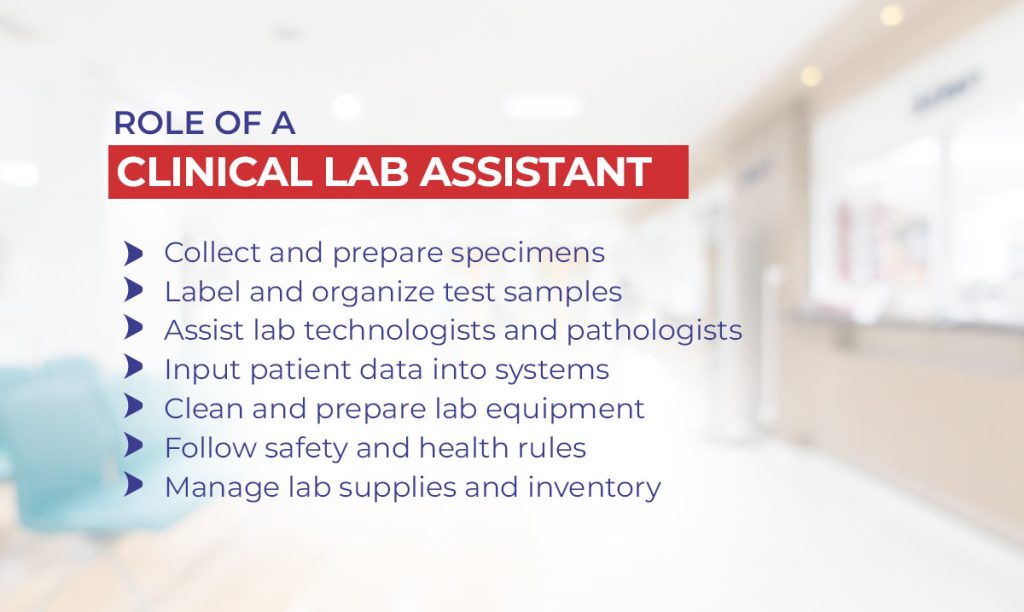From Behind the Scenes to Frontline Support—The Unsung Heroes of Diagnostics
Have you ever asked yourself what happens to your blood sample after a test?
It doesn’t just go into a machine and disappear. Real people work hard behind the scenes to make sure your results are fast and accurate. These people are clinical lab assistants. They prepare, handle, and process your samples with care. Every test result your doctor sees often starts with a lab assistant.
In busy hospitals and labs, their work helps doctors make quick and correct decisions. Without lab assistants, many diagnoses would take longer. Some could even be wrong. That’s why their role matters so much.
They don’t just help—they play a key part in the healthcare system. Their job needs focus, care, and quick thinking. They deal with samples, tools, and patient data every day. Still, many people don’t know what they do. So, if you’re curious about their job, you’re in the right place.
In this easy-to-follow guide, we’ll explore what a clinical Lab Assistant does, the skills they need, where they work, and how you can become one.
Let’s dive in and uncover the world of lab assistants—because these behind-the-scenes heroes deserve to be seen.
What Does a Clinical Lab Assistant Do?
A clinical lab assistant (also known as medical laboratory assistant) is a trained healthcare worker who supports medical labs. They help collect, prepare, and process patient samples for testing. These samples include blood, urine, and other body fluids.
Their main job is to help the lab run safely and smoothly. They are not doctors or lab technologists, but their role is just as important.
They work with lab equipment, label samples, record data, and assist in daily lab tasks. Their attention to detail helps ensure test results are fast and accurate. On a typical day, they may handle samples, prepare lab tools, and follow health standards carefully. In simple terms, lab assistants make sure the lab stays on track.
Recent research highlights the expansion of MLA roles as a key solution to easing the workload of medical lab professionals and addressing healthcare staffing shortages.
You’ll find them working in hospitals, clinics, private labs, and research centers across the U.S. Cities like New York, Dallas, and Chicago rely on their skills to keep healthcare moving.
Without lab assistants, many test results would be delayed. That means doctors would have to wait longer to treat patients.
Key Responsibilities of a Clinical Lab Assistant
A clinical lab assistant handles many important tasks each day. Their work keeps the lab running smoothly and safely. Every step they take supports patient care.

Here’s a closer look at what they do:
- Collect and prepare specimens: This includes blood, urine, or other samples from patients.
- Label and organize test samples: Each sample is marked clearly to avoid mistakes.
- Assist lab technologists and pathologists: They support skilled lab staff during testing and analysis.
- Input patient data into systems: Accuracy is key when entering health records or test details.
- Clean and prepare lab equipment: Tools must be ready and sterile for every use.
- Follow safety and health rules: They wear protective gear and follow strict lab procedures.
- Manage lab supplies and inventory: They check stock levels and restock when needed.
Each task may seem small, but together, they make a big impact. One missed step or wrong label could lead to a delayed or incorrect diagnosis.
That’s why lab assistants must stay focused, organized, and alert. Their role may be behind the scenes, but the work they do helps save lives.
Skills Every Lab Assistant Needs
You don’t need a Ph.D. to succeed as a lab assistant. However, the role does require a strong skill set. These skills help you stay efficient, safe, and accurate in a busy lab setting.
Following are the top skills every clinical Lab Assistant should have:
- Attention to detail: Small mistakes can cause big problems. You must follow steps carefully, double-check labels, and keep accurate records.
- Time management: Labs move fast. You’ll often handle many tasks at once. Knowing how to manage your time helps you stay on track.
- Clear communication: You won’t work alone. You need to speak clearly with lab techs, nurses, and sometimes patients. This helps avoid confusion and keeps the lab running smoothly.
- Tech skills: Many labs use software to track samples and results. You should feel comfortable using computers and lab equipment.
- Physical stamina: You’ll spend a lot of time on your feet. The work can be active, so it’s important to stay energized and alert.
- Problem-solving: Things don’t always go as planned. If a sample is damaged or a machine stops working, you’ll need to stay calm and think quickly.
In addition to these technical skills, soft skills matter too. Being kind, patient, and a good listener can make a big difference in a busy work environment.
Together, these skills help lab assistants succeed and help patients get the care they need.
Where Do Lab Assistants Work?
Clinical Lab Assistants can be found in many places across the U.S. They are needed anywhere lab testing is done. Their work supports doctors, nurses, and most importantly—patients.
Below are some of the most common places they work:
- Hospitals: Large medical centers like the Mayo Clinic or Cleveland Clinic rely on lab assistants to process patient samples around the clock.
- Outpatient labs: Facilities like Quest Diagnostics handle thousands of tests daily. Lab assistants help sort, label, and prepare those samples.
- Private clinics and urgent care centers: Smaller clinics also need lab support. Here, assistants may take on more tasks and interact closely with medical staff.
- University research labs: Colleges and research institutions often use lab assistants for clinical studies or medical experiments.
- Public health departments: State and local health offices use lab assistants during outbreaks or for routine health screenings.
No matter the location, lab assistants play a key role in healthcare. From Houston to Seattle, they help speed up test results, reduce wait times, and keep labs running smoothly.
Their impact may be behind the scenes, but it touches every patient, every day.
How to Become a Clinical Lab Assistant?
Starting a career as a clinical Lab Assistant is easier than you might think. You don’t need a long degree. Most people begin with a certificate or diploma program.
Many community colleges and technical schools offer these programs. They usually take 6 to 12 months to complete, making them a fast way to enter the healthcare field.
During your training, you’ll learn important skills. Common subjects include:
- Phlebotomy techniques: Learn how to draw blood safely and correctly.
- Medical terminology: Understand common terms used in healthcare and labs.
- Laboratory procedures: Get hands-on practice with daily lab tasks.
- Safety and infection control: Know how to keep yourself and others safe.
- Specimen processing: Learn how to handle and prepare different types of samples.
Most programs also include on-the-job training. This helps you gain real-world experience in a lab setting. You’ll work with lab tools, follow safety steps, and learn from professionals.
Some states may also require certification. It’s always a good idea to check the rules in your area before you apply.
Need help getting started? A healthcare staffing agency can guide you. They can connect you with training programs and help you find your first job in the field. Starting this career path is a smart move. It’s quick, affordable, and opens doors to long-term growth in healthcare.
Salary and Job Outlook in the U.S.
If you’re looking for a stable job in healthcare, becoming a clinical Lab Assistant is a great choice. The demand for lab assistants is growing across the country.
According to the Bureau of Labor Statistics, the job outlook is strong. More people need healthcare, and more lab tests are being done. That means more labs need trained support staff.
Here’s what you can expect:
- Average Salary: Most lab assistants earn between $35,000 and $48,000 per year, depending on experience and location.
- Top Hiring States: California, Florida, Texas, and New York offer the most job openings and competitive pay.
- Job Growth: Employment for lab assistants is expected to grow by 7% over the next 10 years. That’s faster than the average for many jobs.
As clinics and hospitals expand, lab work will continue to rise. This steady growth creates more job opportunities and room for career advancement.
Whether you’re just starting out or changing careers, it’s a solid field with long-term potential.
Workplace Challenges to Expect
Like any healthcare role, being a clinical Lab Assistant comes with challenges. Knowing them ahead of time can help you prepare.
Here are a few common ones:
- Fast-paced shifts: Labs often stay busy. You may have many samples to handle in a short time.
- Exposure risks: You’ll work with blood, body fluids, and chemicals. Following safety rules is a must.
- Repetitive tasks: Some tasks, like labeling and sorting, are done often. It can get routine.
- Tight deadlines: Doctors need test results quickly. That means you’ll often work under pressure.
Still, there are simple ways to manage these challenges:
- Double-check your work: This helps prevent mistakes and reduces stress.
- Wear proper PPE: Gloves, masks, and lab coats keep you safe. Never skip them.
- Take short breaks: Quick pauses during your shift help you stay focused.
- Keep learning: Stay updated on lab skills and safety practices. It keeps your mind sharp and your job safer.
The work can be tough at times, but with the right habits, you can thrive. Staying calm, careful, and consistent makes all the difference.
Career Growth and Next Steps
This entry-level job can lead to more. With experience, lab assistants can move into roles like:
- Medical Laboratory Technician
- Phlebotomist
- Lab Supervisor
- Clinical Research Assistant
Some go on to become Medical Technologists with more schooling. The path is flexible, and your foundation matters.
Why Does a Healthcare Staffing Agency Help?
Starting a career in healthcare can feel overwhelming. With so many jobs, programs, and requirements, it’s hard to know where to begin.
That’s where a healthcare staffing agency can make a big difference. They offer expert help every step of the way. Whether you’re new to the field or switching careers, they make the process easier and faster.
Here’s how they help you:
- Match you with the right lab: Based on your skills and goals, they connect you with jobs that fit.
- Improve your resume and interview skills: They guide you on how to stand out and speak with confidence.
- Open doors across states: Many agencies have listings in different cities and states. That means more options for you.
- Suggest training or certification programs: They help you find the right classes to boost your skills and meet job requirements.
Instead of searching alone, you get support from people who know the industry. This saves you time and helps you find better job matches.
Final Thoughts
If you enjoy science, teamwork, and helping others, becoming a clinical Lab Assistant could be the perfect fit. This role combines hands-on tasks with real medical impact.
Every day, you’ll support doctors, nurses, and patients by making sure lab tests are done the right way. Your work helps catch illnesses early and guide treatments fast. That means you won’t just have a job—you’ll have a purpose.
It’s also a great starting point. You can begin with a short training program and start working in less than a year. Over time, you’ll build valuable skills, gain experience, and explore new roles in the healthcare field.
Many lab assistants go on to become lab technicians, phlebotomists, or even medical technologists. So, this job isn’t just about now—it’s about where you can go next.
If you’re looking for a stable, growing, and rewarding career, this path is worth exploring.
Ready to start your lab career?
Take the first step with Intuitive Health Services—your trusted partner in healthcare staffing.
👉 Apply for Clinical Lab Assistant Jobs
Find roles that match your skills and goals.
Get help with training, certification, and job placement.
Start strong. Grow fast. Make a real impact.

